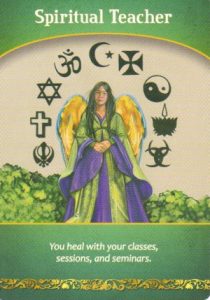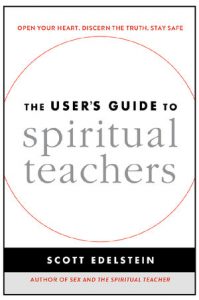Interview with Scott Edelstein, author of The User’s Guide to Spiritual Teachers: A Trusted Resource For Finding The Right Guide For Your Spiritual Journey.

by Maria Koropecky, Wellness Coach
A couple of months ago in April, as I was walking through my neighbourhood on what I call a wellness walk, I was thinking about the next steps of my career. I thought perhaps I’d like to take my wellness coaching to a new level and become a spiritual teacher as well. I got the idea from my 6th grade teacher, Sister Catherine, who appeared to me in a dream.

A month or so later, I received a media release about The User’s Guide to Spiritual Teachers: A Trusted Resource For Finding The Right Guide For Your Spiritual Journey by Scott Edelstein, in my email.
Funny how things like that happen. I was intrigued by the title, so I got a copy of the book, read it from cover to cover, and then arranged an interview with Scott, the author. We had a fascinating conversation and we covered a lot of ground.
I honestly had no idea that looking for a spiritual teacher was a thing, but it is, and it makes sense because more and more people are waking up and are searching for the answers to life’s big questions. On top of that, there’s so much out there to choose from than ever before in history.
How do we know what spiritual path is best for us personally to follow and
who do we want to walk with on our journey?
I’m grateful that Scott is leading the conversation on this important topic about finding a spiritual teacher because the road is not always straightforward. In fact, there are people out there who would gladly take advantage of unsuspecting seekers and lead them astray, causing great damage.
Scott, the author, genuinely wants to help people with the process of finding a suitable spiritual teacher. As a longtime practitioner of both Judaism and Buddhism, he has been on his own spiritual journey and has studied happily and productively with spiritual teachers for the past four decades. He is a committed proponent of serious spirituality in all forms and traditions and has also served as editor and literary agent for several spiritual teachers.
In his book, Scott gives guidelines on how to navigate these waters and how to work with the legitimate spiritual teachers of the world. Here is an abridged transcript of the first 30 minutes of our interview that took place in June of 2017 over Skype.

MK: Welcome, Scott, thank you so much for joining me today to talk about your book, The User’s Guide to Spiritual Teachers: A Trusted Resource For Finding The Right Guide For Your Spiritual Journey.
MK: I read your book and I really enjoyed it. I found it to be a very easy read – very quick and clean and just really easy to understand – and I appreciated that. What prompted you to write this book?
SE: Several things. The first is, there’s a lot folks out there who call themselves spiritual teachers and some come from within a religious tradition, some stand outside religious traditions. Some are called spiritual coaches, spiritual counsellors, spiritual directors, but whatever they call themselves, they can create a great deal of spiritual intimacy with the people with whom they work and they typically work one to one with folks, very much like a coach of any kind would.
SE: The difference though with a spiritual teacher, or coach, or so on, is, they get to see our vulnerabilities, they get to see our most urgent needs, desires, and wants, and concerns. And so if the [spiritual teacher] you’re working with isn’t very good, they can do a lot of harm. And if they are a predator, or a narcissist, or a sociopath, they can do terrible harm.
SE: The other thing is, it’s not always easy to tell a good spiritual teacher from a not-so-good one. If you were looking for a good car mechanic, all you have to do is see whether they’re good at repairing your car.
SE: But someone can be very charismatic, can speak very well, can have a lot of poise, [but] may in fact be a charlatan or a predator, [and] may pass themselves off as a spiritual teacher, so I wanted to help people protect themselves and wanted to help them build their own discernment. I wanted to help them learn to trust themselves and make good choices.
The Possible Ugly Side of Spiritual Teachers
MK: Have you experienced or witnessed anyone being influenced by someone who is a charlatan or a fraud, or anything worse than that? Have you seen that?
SE: Sure. In fact, that’s one of the sad things about the helping professions in general is that they have an unusually high rate of people who are charlatans, frauds, abusers, and so on. And that doesn’t mean that these professions are somehow inherently flawed, it’s because they attract those type of folks.
SE: Now the great majority of people in any helping profession — whether it’s coaches, therapists, counsellors, ministers, or spiritual teachers – the great majority, of course, are on the up and up.
SE: They will range from the wonderful to the terrible, but the fact is, the people who want to be exploitive are naturally going to gravitate to these positions because it provides them with people to exploit. And I’ve seen it over and over.
SE: Sometimes it runs the whole range. Sometimes it’s people who are just making mistakes or people who have (in terms of the spiritual teachers) a higher opinion of themselves than is reasonable, because it does attract egotists, but yes, there’s plenty of abusers out there.
SE: I did a previous book, a kind of prequel to this one. It was called, “Sex and the Spiritual Teacher” about spiritual teachers who go astray and have sex with their students or followers, and so it’s a common problem.
SE: It’s not common as in you should expect it all of the time. It’s common as in you might be left-handed or you might be colour-blind. The issue is that if we are not careful, if we don’t give the same kind of consideration to a potential spiritual teacher as we would with a new doctor, or new therapist, or new coach, or a new dentist, then we set ourselves up.
SE: And so we need to learn to build our own discernment. That’s what both of these books are about. And sure, I know cases where people did it, they lost their way, and I know other people who very deliberately went out of their way and have been, in some cases, exploiting people and lying to people for decades.
MK: Wow.

Spotting the Red Flags
SE: You’re a coach, you must know some coaches who are not very good and you probably know a couple of coaches who are charlatans.
MK: Reading your book really let me see that because my coaching teacher operated with integrity and I didn’t really realize that until I read your book. I looked at the signs and yes, he did. And then after that, I was introduced to another person who didn’t [establish good boundaries] and who pushed my buttons and asked for – you mentioned this in your book – asked me to follow their authority. [They basically said,] “Don’t think for yourself; I’ll think for you,” – that kind of thing, and they at one point did say that to me, “Obviously, how you’re thinking isn’t working, so you’re going to have to turn that over to me,” and I was dumbfounded by that…
“That is the surest sign of all that something is wrong. When somebody does not want you to be more of who you are but wants you to be less of who you are,” ~Scott Edelstein
SE: That is the surest sign of all that something is wrong. When somebody does not want you to be more of who you are but wants you to be less of who you are.
SE: Or, when they want something from you, whether that’s obedience, or sex, or flattery, or money. I mean obviously, if they’re performing a particular service, like a coach would have a rate for charging for what they do, and that’s perfectly reasonable… but otherwise, they’re trying to get something from you, and they’re looking out for themselves more than they’re looking out for you, [then] something is wrong.
MK: Sometimes it’s not so obvious and you’re caught up in it and those types of statements just wash past you, and you may see it in hindsight, or not. How does someone, if they’re speaking with a spiritual teacher, and they’re being vulnerable, and are expressing ideas and feelings that they haven’t told anyone else, are being authentic, etc.. How do you do that and learn and grow and still keep your wits about you, so you don’t get caught up in someone else’s trap or whatever. How do you do that?
SE: It’s a wonderful question. I’ll answer it in two ways, one of course is to read the book and I don’t say that in a silly way, that’s why I wrote a book. We write books, of course, because there are sometimes longer answers that can be most helpful. That’s why I wrote both “The User’s Guide to Spiritual Teachers” and the book, “Sex & the Spiritual Teacher.”
SE: But as a kind of general guide, I would say, apply the same principles that you would if you were beginning to date a potential partner. In other words, obviously, you would not throw yourself at someone’s feet, on a first date, or a second date, or a third date.
SE: In fact, if during that first date, [you thought] “Oh my God, this person is the one and everything feels perfect, I can’t believe how wonderful it is,” – if you were to ask a friend, “Oh this person just seems fantastic… this person seems perfect… should I throw myself at their feet?” your wise friend would say, “No, be very careful, have a second date.”
SE: So, it’s perfectly fine if you see these yellow flags or even red flags, you either – if it’s a red flag, if something feels wrong, looks wrong, sounds wrong – get away, back away, just as you would if you were on a date with somebody and you went, “I have a really bad feeling about this.” Trust your own body, mind, and gut, and heart. That’s one.
Building Trust with your Spiritual Teacher
Let’s imagine they’re all saying, “yes, yes, yes, yes.” Of course you wouldn’t then just run away. But you also wouldn’t necessarily run forward. The wise thing to do would be “OK, this feels really good, this feels really right,” so that bears having a second date. Having that good sense about a spiritual teacher, proceed very slowly, look at the other people who are around them, their students, or followers, congregants, or whoever it might be.
If things feel right, and the person is looking out for your best interest, things will continue to feel right, and then slowly the trust will build. There’s really no hurry about it, after all.
So, just as you would say, go out on a second date, go out on a third date, and slowly you’ll come to understand who this person really is and how you’re able to work with them.
But When Things Go South…
SE: But if something starts out feeling bad at first, that’s easy, you get away. If it feels good at first and the person is a predator or a narcissist, sociopath, or what not, by the time you’re on your third or fourth encounter, it will no longer feel so great. You’ll notice that something is wrong. It’s just a matter of exercising a reasonable amount of caution, not just with the other person, but with yourself.
MK: Interesting. Yes, and so, would that apply to a one-on-one relationship, like with a coach, and being in a group, like going to a Buddhist center? Would you say it’s pretty fair that they’re both an equal approach?
SE: I’d say, all of the above. And I would say that, too, for anyone who is in any kind of coaching role or any kind of spiritual role, including a Minister, or Priest, or Imam, or Rabbi, down the street. It’s just that when you’re simply sitting in a congregation, there’s not going to be as much intimacy, and there’s less vulnerability, less opportunity for exploitation, and so on.
Are they a Spiritual Teacher or a Spiritual Leader?
The answer is they could be both, could be more one than the other. The important thing has to do with finding your discernment, recognizing that vulnerability, and learning to trust yourself (just as you did) as opposed to letting someone else take over.

Practicing Discernment & the Vagus Nerve
MK: You’ve used this word “discernment” a few times and this word is new to me within the last year. I didn’t really know this word but I’ve heard it many times lately and it’s on my radar now. So what do you mean by discernment?
SE: That’s a wonderful question. First, let me answer it in terms of the body because the body knows. It doesn’t know everything but it knows a lot. If we pay attention to our body, it will tell us, not necessarily every time, but most of the time, if something is amiss. It will be tight or it will give us some kind of warning sign.
SE: Now, I’ve only recently learned there is an actual physical structure in the body doing that called the “Vagus Nerve.” That’s when our stomach tightens, we feel our heart in our throat, where we feel love, hate, dread. A lot of these emotions are actually a physical structure that we call, “Vagus Nerve.” So, it’s paying attention to that.
SE: And it’s not letting yourself be thrown to the winds, either by an idea or by the thinking brain. I’m not saying, “don’t think” by any means. I’m saying, “do think.” Discernment is also learning when to override the body with the brain. Just as you wouldn’t go out on a date and the person is really, clearly being obnoxious and nasty and your body might be going, “yeah, but they are so good-looking” and the brain is going to say, “doesn’t matter, get out.” The person is sort of striking their hand with their fist, saying, “I’m going to beat up anyone who gets in my way,” well, it’s time to get out no matter how good looking the person is.
SE: The other thing is developing your own ability to sniff out bullshit, whether it’s from a spiritual teacher or anyone else. To a certain degree, as we get older, that just gets better and better. I mean, there are things that might have fooled you at age 20, would never fool you at the age you’re at now. Some of that comes naturally, but a lot of it, especially for people who have never worked with a spiritual teacher before, they don’t have the experience to be able to make that kind of judgement. Especially if they’re new to the tradition, if the person is from another country, sort of thing.
SE: And so rather than trying to come up with a simple process, it’s a matter of just keeping yourself safe while you learn, while your own experiences teach you.
Are We in a Spiritual Age?
MK: Are you finding that more and more people are seeking out spiritual teachers and are entering this world of awareness and awakening?
SE: Good question. These things are cyclical. They go back to ancient Greece, there were spiritual teachers on the street corners, essentially selling themselves, [saying] “Here’s what I think, here’s what I believe, here’s what I can teach you.” Some of them were teachers in general who had spiritual components, some of them focused on what could be called spirituality today, and so there was a big market place of ideas at the time.

SE: [It’s called] an “Axial Age,” when [that type of thing is] happening. I pick out Ancient Greece, but arguably, it was happening in India, at roughly the same time, as well, and I don’t know if it’s a higher percentage of people than in the past that are actually building these relationships, that are looking for spiritual teachers, but I would say that, for instance, I’m in my sixties now and when I was young, the whole relationship that people had to the clergy and groups was much more limited in general – you joined a group, some kind of a congregation, went to services, you might have, (if you were very devout, or concerned, or what not), you might have received some counselling from the minister.
SE: And so, that was how the relationship tended to be defined. Whereas now we have a big marketplace of ideas, and opinions, and relationships because the Internet has made it possible for anyone really with a phone or computer to be able to access writings, videos, and sometimes face-to-face conversations.
SE: So, I don’t know if human beings have changed, but the ability to access these kinds of people and these kinds of relationships has changed.
Enter the Age of Spiritual Mashups
MK: And there’s so much more to choose from, like when you go to the grocery store, you have foods from all over the world that you could pick, whereas before, it was like, this is it. You can pick and choose and you don’t have to stay where you started. You have access to all kinds of things – there seems to be some overlap. People will start with one tradition and then kind of pick and choose from others and then create their own.
SE: That is part of the time we’re in and also, I would argue, that there’s something in particular, in North America, where we like to do these mashups. Partly, it’s because North America, for the past really 400 years, it’s full of immigrants, and we’ve always been taking in immigrants, and that’s what we do in North America, we mash things up.
SE: And so, we’re an ideal place for many different traditions to appear, to come together, to be re-made, and to intertwine. And that is what happens, of course, that’s naturally what happens, but we do it arguably more and faster, and with more wild abandon, 🙂 than most cultures throughout history!
MK: It’s accelerating!
“That’s what we do in North America, we mash things up.
We’re an ideal place for many different traditions to appear, to come together, to be re-made, and to intertwine,” ~Scott Edelstein
SE: Yeah. Think of all of the places where you can get…what did I just see?… I saw Mexican Egg Rolls on a menu recently. I didn’t try them, but there you go. That’s a classic thing and we do it with spirituality, too.
SE: But that isn’t new. If you look at what we call “Tibetan Buddhism,” for example, we call it Buddhism, but it’s clearly a mashup. The historical roots are very clear. It’s a mashup of Buddhism that came North from India and what was the native religion of Tibet at the time – which was called, “Bon,” [spelled] B-O-N, and those two came together and created this new form of Buddhism, called “Tibetan Buddhism,” and that’s true with all religions.
SE: There are variances of Protestantism here in the United States where I live, where you would not find anywhere else in the entire world, and in Judaism, there’s an old rubric, an old metaphor, that says, “Judaism is like wine being poured into different coloured bottles. It’s the same wine, but it’s going to look different depending on the colour of the bottle that it’s in,” – and the colour, of course, is the culture.
MK: Oh, neat. Very interesting. I think there’s so much wisdom in the classics and if they didn’t have that inherent wisdom, they wouldn’t be here today. I wonder, do you think there’s a universal truth that all, or most religions keep up at the top of their list… is there one thing that makes them all kind of the same?
The Perennial Philosophy
SE: The answer I would have to give is “yes” and “no.” Let me give you both. There is something often called the “perennial philosophy.” Those words were, I think by Aldous Huxley who wrote “Brave New World” and a bunch of books back maybe about 80 years ago, 70 years ago. I hope I’ve got the reference right, I believe it was Huxley, and that does refer to that group of principles, ideas, relationships that permeate most world religions, and there are things that you would reasonably expect about love, concern, cooperation, the need for meaning, the need for belonging, those sorts of things.
SE: So yes, but… it’s a little bit like asking the question, can you trust a police officer? And the answer is, they are in a position of trust, and overall, we would do better to trust them than to distrust them all. But you still have to make your case by case judgement.
SE: Same as spiritual teachers and with religions is that for every religion that would say, “you can go to Christianity, you can go to Buddhism, you can go to Islam, you can go to anyone you want, Zoroastrianism,” and there will be lots and lots of people who say, “Oh yes, the perennial philosophy is, of course, the core of what we do,” and then you will find some other folks within that tradition who will say, “Absolutely not, the other religions are all wrong, the other versions of this religion are wrong.”
SE: That’s true with every religion. So yes, there is this perennial philosophy and then there are always these outliers who are denying the perennial philosophy in the name of that religion.
MK: I’m right and you’re wrong.
SE: Yes. Period.
MK: I’m wondering if that could be another way for someone who was looking for a spiritual teacher, to see how closely they embrace that perennial philosophy?
SE: That is a wonderful idea! If you don’t mind, I’d like to put, if there’s ever another edition of this book, I’d love to put that in. Yes. I think that’s great to add on top of the discernment. Yes, to be looking at how closely it comes to that. That’s wonderful.”

Well, readers, that was just the first half hour of my conversation with Scott Edelstein! As we explored this topic about spiritual teachers, I must admit, I felt a little like Oprah on SuperSoul Sunday.
In a nutshell, if you’re looking to find a decent spiritual teacher to work with, remember to:
1) Practice discernment, (listening to your body as you tune into your thoughts and feelings),
2) Notice how closely the people you are working with adhere to the Perennial Philosophy, and
3) Of course read Scott’s book, The User’s Guide to Spiritual Teachers: A Trusted Resource For Finding The Right Guide For Your Spiritual Journey, for yourself.
Please visit Scott’s website on spiritual teachers, www.thespiritualteachersite.com, for more information on this topic and to buy his books.
Now over to you. Are you in the process of looking for a spiritual teacher? If so, please contact either me or Scott and let’s talk.
Amazon
We are a participant in the Amazon Associates Program, an affiliate advertising program designed to provide a means for us to earn fees by linking to Amazon and affiliated sites.